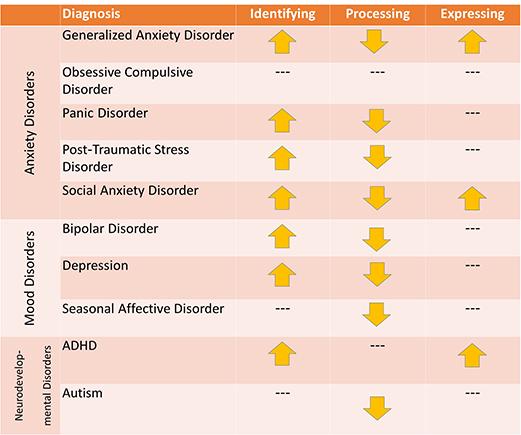
The novel MAS model linked emotion regulation to personality and wellbeing in surprising and unexpected ways.
For decades psychologists have studied how people regulate emotions using a multitude of ways to conceptualize and assess emotion regulation. Now a recent study published this week in the journal PLOS ONE by Elliot Jurist and David M. Greenberg of The City College of New York, shows how a new assessment model can give clinicians an exciting new way to think about clinical diagnoses including anxiety, mood, and developmental disorders.
The authors developed the Mentalized Affectivity Scale (MAS) – a novel assessment model which breaks emotion regulation into three elements:
· Identifying: the ability to identify emotions and to reflect on the factors that influence them (e.g. childhood events)
· Processing: the ability to modulate and distinguish complex emotions
· Expressing: the tendency to express emotions outwardly or inwardly
Jurist and Greenberg administered the MAS to nearly 3,000 adults online. Statistical modeling of the results showed: processing emotions delineates from identifying them and expressing emotions delineates from processing them.
The team of psychologists also found that emotion regulation was linked to personality and wellbeing in surprising and unexpected ways and that the ability to process and modulate emotions was a positive predictor of wellbeing beyond personality and demographic information. As the accompanying chart shows, one of the most important findings was how the three elements linked to the participants’ prior clinical diagnoses across anxiety, mood, eating, and neurodevelopmental disorders.
“We have introduced a way for psychologists and psychiatrists to use emotion regulation to supplement diagnoses,” said Greenberg, the lead author who is a postdoc student at Colin Powell School for Civic and Global Leadership.
Jurist, the senior author and director of the Mentalized Affectivity Lab at CCNY and Professor at the Colin Powell School for Civic and Global Leadership said: “For the first time we have empirical evidence for the validity and usefulness of the theory that can be carried out into the mainstream by neuroscientists, emotion researchers and psychiatrists.”
About The City College of New York
Since 1847, The City College of New York has provided low-cost, high-quality education for New Yorkers in a wide variety of disciplines. Today more than 16,000 students pursue undergraduate and graduate degrees in eight professional schools and divisions, driven by significant funded research, creativity and scholarship. Now celebrating its 170th anniversary, CCNY is as diverse, dynamic and visionary as New York City itself. View CCNY Media Kit.
Rebecca Rivera
Writer/Editor
The City College of New York
212-650-5310